Anarky
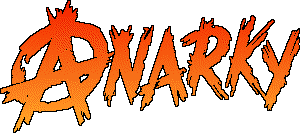
 In the age of the anti-hero, it only makes sense to have the occasional anti-villain as well. But unlike sociopathic vigilante anti-heroes like the Punisher, an anti-villain like Anarky provides some interesting food for thought. Sure, he breaks the law, but what he really wants is to save the world… and maybe he’s right.
In the age of the anti-hero, it only makes sense to have the occasional anti-villain as well. But unlike sociopathic vigilante anti-heroes like the Punisher, an anti-villain like Anarky provides some interesting food for thought. Sure, he breaks the law, but what he really wants is to save the world… and maybe he’s right.
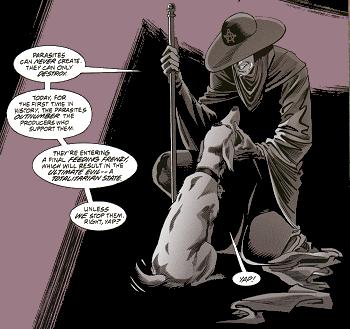 A relatively recent addition to Batman’s gallery of villains (created by Grant and Breyfogle, the creative team on this book), Anarky is a 15-year-old genius. And like many adolescents who’ve read too much sociopolitical philosophy, and with not enough experience with how the world really operates, Lonnie Machin is a believer in anarchism. He wants to free everyone from the institutions that a small parasitic minority use to oppress the masses, to let/make everyone take responsibility for themselves. His costume bears a not-coincidental similarity to the protagonist of Alan Moore’s V for Vendetta, also based on the historical character of Guy Fawkes (best known for conspiring to bomb Britain’s Houses of Parliament, as I recall).
A relatively recent addition to Batman’s gallery of villains (created by Grant and Breyfogle, the creative team on this book), Anarky is a 15-year-old genius. And like many adolescents who’ve read too much sociopolitical philosophy, and with not enough experience with how the world really operates, Lonnie Machin is a believer in anarchism. He wants to free everyone from the institutions that a small parasitic minority use to oppress the masses, to let/make everyone take responsibility for themselves. His costume bears a not-coincidental similarity to the protagonist of Alan Moore’s V for Vendetta, also based on the historical character of Guy Fawkes (best known for conspiring to bomb Britain’s Houses of Parliament, as I recall).
Of course not everyone feels that’s such a good idea, including more than a few of that oppressed majority. This (and the dogged efforts of Batman to stop him) are Anarky’s greatest challenges. So in this four-part series, he goes on a kind of classic heroic quest, to find what he needs to overcome this problem. Although my usual complaint about limited series like this is that they would be better released in a single volume, writer Alan Grant uses the serial format effectively. Each of the first three issues features one third of Anarky’s quest, encountering the Demon Etrigan, Darkseid, and the Batman. In the final issue, Anarky (and Grant) brings it all together for the culmination of the plot.
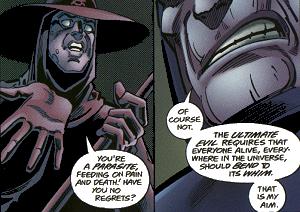 I’ve never cared much for Darkseid as a character, for much the opposite reason that I find Anarky somewhat intriguing: he’s just plain evil and just plain too powerful. And I find it a bit hard to swallow when a character like Anarky comes face to face with him. But as it fits in well with the nature of Anarky’s quest, I’m willing to forgive Grant for playing it for chuckles a little. It just takes a bit of suspension of disbelief when Darkseid doesn’t casually turn Anarky into a wet smudge on the floor.
I’ve never cared much for Darkseid as a character, for much the opposite reason that I find Anarky somewhat intriguing: he’s just plain evil and just plain too powerful. And I find it a bit hard to swallow when a character like Anarky comes face to face with him. But as it fits in well with the nature of Anarky’s quest, I’m willing to forgive Grant for playing it for chuckles a little. It just takes a bit of suspension of disbelief when Darkseid doesn’t casually turn Anarky into a wet smudge on the floor.
Some of the “science” mentioned takes a similar suspension of disbelief. How Anarky got so smart, the second ulterior motive behind his quest, and the mechanism of his grand scheme are all pretty half-baked not-in-the-real-world science. The fact that Anarky’s scheme takes an old super-villain cliche and turns it on its head (not to enslave the world, but to free it) just barely redeems it.
The whole story itself seems like just a vehicle for Grant to pose some philosophical questions about the nature of human society, its relationship to the individual, and how evil and free will interrelate. In doing so, he provides a fair argument in favour of the anarchist philosophy… and also points out a common flaw in the thinking of many self-described anarchists. And he manages to do this without boring the reader, as well.
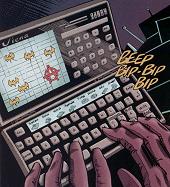
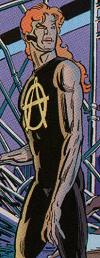 Norm Breyfogle’s art is far from boring as well. He does a fine job rendering some of the fantastic - as well as mundane - scenes that Grant’s script calls for. My only complaint about the art (aside from Anarky looking a bit old for a 15-year-old when we see him without his mask) is the way he draws tech stuff. As a years-long user of Psion’s wonderful pocket-sized computers, I got a kick out of seeing that Anarky uses a Psion Siena personal organiser. But like much of the hardware we see, it’s boxy and awkward, instead of the sleek little gadget it is. At the least, Josef Rubinstein should have had a photo reference to ink it properly. And wouldn’t a criminal genius like Anarky have gone for the top-of-the-line Psion Series5 instead? {grin} It has a bigger, back-lit screen for using in dim light, after all.)
Norm Breyfogle’s art is far from boring as well. He does a fine job rendering some of the fantastic - as well as mundane - scenes that Grant’s script calls for. My only complaint about the art (aside from Anarky looking a bit old for a 15-year-old when we see him without his mask) is the way he draws tech stuff. As a years-long user of Psion’s wonderful pocket-sized computers, I got a kick out of seeing that Anarky uses a Psion Siena personal organiser. But like much of the hardware we see, it’s boxy and awkward, instead of the sleek little gadget it is. At the least, Josef Rubinstein should have had a photo reference to ink it properly. And wouldn’t a criminal genius like Anarky have gone for the top-of-the-line Psion Series5 instead? {grin} It has a bigger, back-lit screen for using in dim light, after all.)
Because this story is part of a shared superhero universe, Anarky could not - in the long run - succeed in his quest to save humanity from its own oppression. Grant provides a good argument for why he’s not allowed to. But interestingly, he does so without invalidating the thinking that underlies Anarky’s basic philosophy. Which leaves this anti-villain with a reason to continue trying to save the world from itself.
